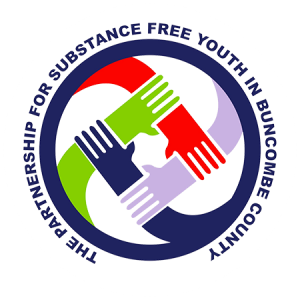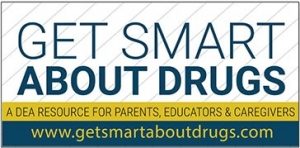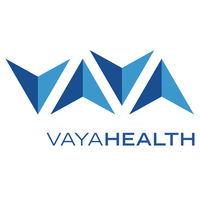Alcohol use by persons under age 21 years is a major public health problem. Alcohol is the most commonly used and abused drug among youth in the United States, more than tobacco and illicit drugs, and is responsible for more than 4,300 annual deaths among underage youth. Although drinking by persons under the age of 21 is illegal, people aged 12 to 20 years drink 11% of all alcohol consumed in the United States. More than 90% of this alcohol is consumed in the form of binge drinks. On average, underage drinkers consume more drinks per drinking occasion than adult drinkers. In 2010, there were approximately 189,000 emergency rooms visits by persons under age 21 for injuries and other conditions linked to alcohol. Furthermore, underage drinking is a serious economic issue, costing North Carolina $1.5 billion in 2010 alone. (CDC, 2014)
We have a responsibility to protect the youth in our community. Retailers are the first line of defense in preventing youth access to alcohol. As al alcohol retailer, you can help us prevent underage drinking in our community
What Are Alcohol Purchase Surveys?
Alcohol Purchase Surveys are performed by trained Coalition members, including an “of-legal-age” buyer. In these random surveys, this trained youthful looking purchaser, without any identification, attempted to purchase an “alco-pop” product or any type of alcohol that is sold at an establishment. (Alco-pop examples are: BOSS, Blast, Joose, Tilt, 4Loco, Mike’s Hard Lemonade and Smirnoff’s Ice). The purpose of the survey is to test retailer compliance with State/local law regarding the sale of alcoholic beverages to underage purchasers. The surveys also identify alcohol establishments that display good business practices that restrict youth access to alcohol.
As you know, the NC Alcohol Law Enforcement recommends to retailers that any purchaser not appearing at least 30 years of age be required to produce satisfactory proof of age. The intent of this recommendation is to eliminate the sale of alcohol to minors. In conducting each survey, if a clerk refused to consummate the sale because of inability to verify age by a reliable method, this was recorded as a “no sale” or desirable outcome. On the other hand, if a clerk rang up the sale at the register without verifying the age of the purchaser, this was recorded as a “sale” or an undesirable result. While no (State/local) laws were broken, the failure of the clerk to make a reasonable or responsible effort to verify the age of the youthful purchaser leads to the conclusion that a particular business may sell alcohol to minors.
Under the terms of the State grant to participating Coalitions, the results of each survey are reported to the North Carolina Alcohol Law Enforcement division of the NC Department of Public Safety.
5 Reasons for Conducting Purchase Surveys:
-
Purchase surveys indicate who is selling alcohol to minors and how often. This lets a community know how large the problem of underage sales is and among which outlets. This information can be very useful in allocating scarce enforcement and prevention resources.
-
The results of surveys can be used to help raise community awareness and build support for efforts to reduce sales to minors. Such events can bring attention to the problem of alcohol sales to minors and make it easier for policymakers, merchants, and concerned citizens to act.
-
Purchase surveys can be an intervention. Informing merchants that they are being monitored by the community and providing them with feedback can motivate those with good policies and sales practices to continue them and motivate those with poor policies and practices to change them.
-
Purchase surveys can be an important part of enforcement. Some communities choose to issue citations to outlets who sell to minors during the surveys. Other communities use the information from the surveys to help target later enforcement efforts. In either case, local police or Alcohol Beverage Control (ABC) authorities must always be involved when enforcement efforts are planned as part of a purchase survey.
-
Purchase surveys can be used to measure the impact of prevention strategies. A series of surveys carried out over time can indicate whether prevention efforts are having an effect on sales to minors. This information can help communities decide whether to continue or discontinue particular policies or programs and can indicate how to modify prevention strategies to make them more effective.
Rules and Guidelines for Alcohol-Selling Retail Outlets:
Avoid failing the alcohol purchase survey by following these rules:
- The law says if you’re not sure the customer is 21, refuse to sell alcohol to that person! Help eliminate the guesswork: Don’t sell unless you’re sure.
- An important thing to remember is that minors come in all shapes and sizes. Think about it. Among a group of minors wanting alcohol, the one who looks the oldest is probably the one sent into the store to try to buy it. There are a lot of kids who will walk right into a store and not think twice about trying to illegally purchase alcohol, they simply do not act nervous.
- You cannot tell by a person’s face, clothes or behavior alone how old the person may be. Kids are clever and smart, and will try many tactics to get you to sell them alcohol.
- Do not rely entirely on a customer’s appearance or behavior when checking identification. Asking a purchaser for their date of birth is NOT the same as checking to see their ID
- Some minor males may have beards and mustaches. Some may have bald or shaved heads. Some minor males are big, which may make them appear older.
- Some minors act very confident and sure of themselves when attempting to purchase alcohol. Some minors will make direct eye contact with you while lying about their age.
- Some minor females may wear makeup or clothing that makes them appear older.
- However, keep in mind that some minors might appear nervous, may not make eye contact with you, may not have facial hair, or may have smooth, unlined faces.
- Ask the customer to hand you the ID so you can closely examine it.
- Look for signs that the ID has been tampered with. Some signs are: irregular laminations; anything other than a smooth surface; bumpy or raised surfaces by the picture; cuts anywhere on the ID; changes to birth dates, expiration dates or “minor until” dates.
- Look at the printing type on the ID. Do all letters and numbers appear the same?
- Compare the picture on the ID to the person before you.
- Do they look the same? Does the physical description on the ID match the person standing before you? (Remember that weight and hair may change, but height rarely will).
- Check the expiration date. If the ID has expired, it is unacceptable.
- You may choose to check the ID of anyone who wants to purchase alcohol. Best practice is to card everybody regardless of age.
Additional Training
Alcohol Law Enforcement – Be a Responsible Seller (BARS)
https://www.ncsbi.gov/Divisions/Alcohol-Law-Enforcement/Be-A-Responsible-Server
ABC Commission NC – Responsible Alcohol Seller Program (RASP)
https://abc.nc.gov/Education/RASP
As a manager and/or owner it is your duty to train your staff on carding policies. Please remember free trainings are available to off-premise business owners, managers and employees through The Partnership for Substance Free Youth in Buncombe County. Contact us for additional information.
Project Mission
These stickers remind adults to check IDs, not sell alcohol to minors and not purchase alcohol for minors, and provide a way for youth to remind adults they are key to helping prevent underage drinking.
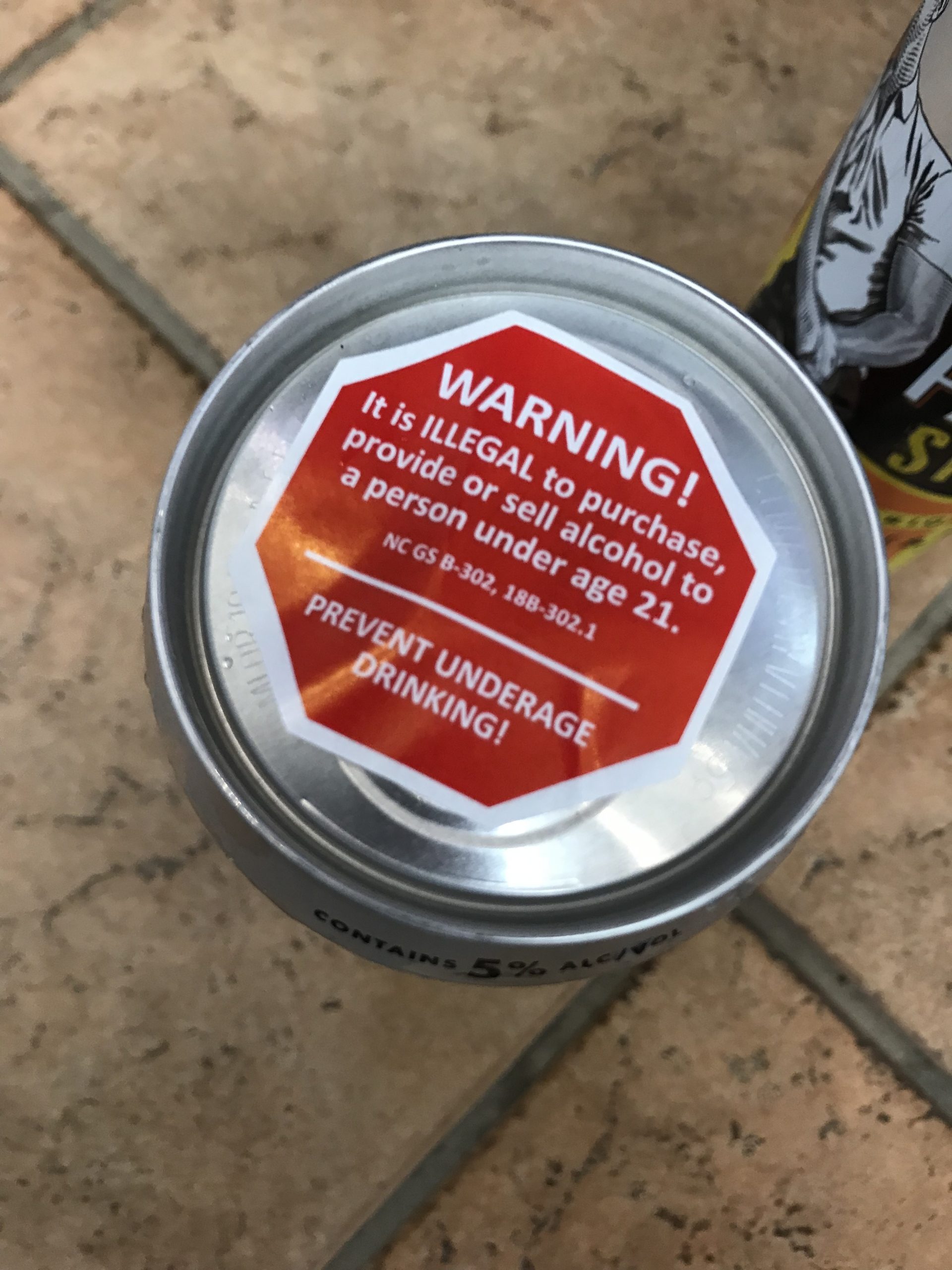
What are Alcopops?
Alcopops are a category of alcoholic products that are full of sugar and flavorings and contain anywhere between 5 and 14% alcohol, depending on the brand. Examples of alcopops include: Mike’s Hard Lemonade, Smirnoff Ice and White Claw Hard Cider and spiked seltzers. Because of their flavoring, low price point and high alcoholic content in one can/bottle, these products can be particularly appealing to youth and young adults.
Why is this important? Alcohol is the most widely abused substance amongst America’s youth. Youth who start drinking before age 15 are 4x’s more likely to develop alcohol dependence or abuse later in life than those who begin drinking at or after age 21. Although drinking by persons under the age of 21 is illegal, people aged 12 to 20 years drink 11% of all alcohol consumed in the United States. Annually about 5,000 people under 21 die from alcohol-related injuries involving underage drinking.
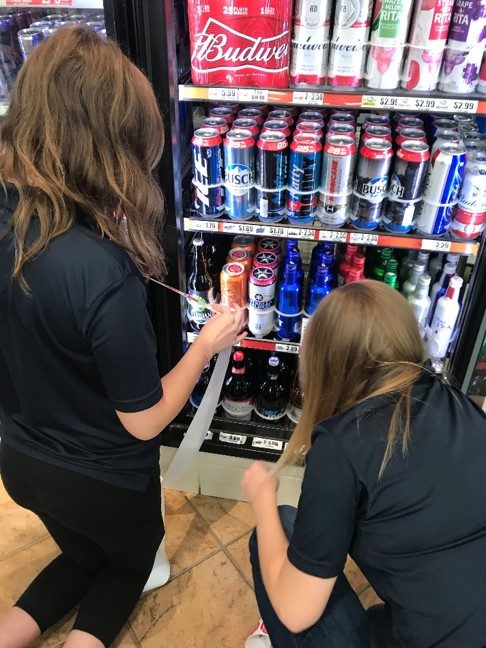
Project Alcopop Sticker Shock! is designed to reach adults who might purchase these beverages legally and provide them to minors. The goal of Project Alcopop Sticker Shock to educate potential furnishers, raise public awareness about underage drinking, and strengthen the deterrent effects of the laws against providing alcohol to underage costumers. Because of the harmful impacts of these beverages on our youth, we also take this opportunity to encourage all merchants to consider ceasing the sale of alcopop beverages in their stores.
How can you help?
Host a Project Alcopop Sticker Shock at your retail location! The Partnership will work with you and our youth to schedule a convenient time for our students to come in and sticker shock your merchandise. The coalition encourages media coverage and will work to highlight the partnership with the business. Adults and law enforcement are present throughout the event. The Partnership provides the stickers which are placed on merchandise only. If you are interested having a sticker shock event at your location, contact us here or at 828-348-2641.

OVER 21
IT IS ILLEGAL FOR ANYONE (EVEN PARENTS) TO GIVE ALCOHOLIC BEVERAGES TO ANYONE UNDER THE AGE OF 21
PENALTIES FOR PROVIDING ALCOHOL TO MINORS
- DRIVERS LICENSE REVOKED FOR 1 YEAR
- 25+ HOURS COMMUNITY SERVICE
- POSSIBLE JAIL TIME
ANY ADULT WHO HOSTS OR PROVIDES ALCHOL TO MINORS CAN BE HELD CRIMINALLY AND CIVALLY LIABLE
UNDER 21
DRIVING AFTER CONSUMING ANY AMOUNT OF ALCOHOL = IMMEDIATE REVOCATION OF LICENSE
IT IS ILLEGAL TO PURCHASE, POSESS, OR CONSUME ALCOHOL
USING A FAKE ID?
- ONE YEAR LICENSE REVOCATION/$200 FINE
- CLASS ONE MISDEANOR/POSSIBLE FELONY
- FINES AND COUTY COSTS UP TO $500
- COMMUNITY SERVICES
- POSSIBLE JAIL TIME
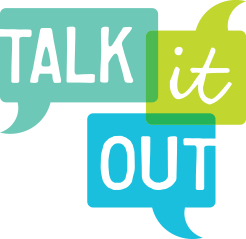
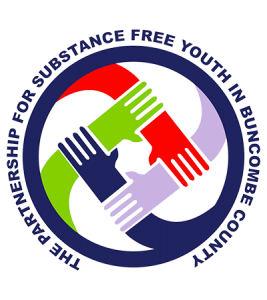
The first step when you suspect your teen has a substance abuse problem is to have your child screened by a experienced medical doctor, certified substance abuse counselor, or an addiction specialist.
Once a diagnosis is made that the teen has a substance abuse disorder, they will be referred for treatment, which helps them stop using the drugs they are addicted to. In March 2014 the Academy of Pediatrics recommended substance abuse screening as part of all adolescent care using the universal Screening for Substance Use, Brief Intervention and/or Referral to Treatment (SBIRT) guidelines designed by the Substance Abuse and Mental Health Administration. A pediatrician can give positive feedback to a teen who hasn’t yet been involved in alcohol and drug use and encourage behavior changes or refer to treatment for those who have been found with a substance abuse disorder.
Screening, Brief Intervention, and Referral to Treatment (SBIRT)
SBIRT is a comprehensive, integrated public health approach to the delivery of early intervention and treatment services for persons with substance use disorders, as well as those at risk of developing these disorders. Where are intervention services provided for the at-risk substance user before more serious consequences occur? At primary care centers, hospital emergency rooms, trauma centers, and other community settings.
Screening: Quickly evaluates the severity of substance use and identifies the appropriate level of treatment.
Brief intervention: focuses on increasing insight and awareness for substance use and motivation toward changes in behavior.
Referral to treatment: Provides those identified as in need of more extensive treatment with access to specialty care.
Research shows that to ensure success for most patients, treatment should combine treatment medications, where available, with behavioral therapy. Today with the Affordable Care Act (ACA) many youth covered under a parent’s health insurance policy are able to receive addiction treatment and care until they are 26. After that the teen can get insurance on his own that will cover his treatment needs. The ACA requires insurers to cover mental health and substance abuse disorder treatment at the same level they’d cover any other medical treatment. Without treatment, a teen may not enter recovery and get back on track at school or work to build the life she hoped to. Recovery is when a person quits taking drugs and starts learning how to live life without drugs.
Substance abuse addiction is typically a chronic disease.
- Relapse is common. Relapse prevention services may increase the success of long-term recovery.
- Long-term or repeated episodes of care for long-term abstinence and recovery are very important.
- Stopping drug use for a few days does not guarantee being cured.
People can recover from drug addiction, but they must be aware of their addiction and work on not using again. Those who are treated for a substance abuse disorder or addiction will have a life of recovery.
If you are seeking treatment for your child, please call VAYA Health
1-800-849-6127. (Toll free 24/7)
Having a crisis? Need immediate help? Call 1-800-849-6127. (Toll free 24/7)
Tiene una crisis? ¿Necesita ayuda inmediata? Llame al 1-800-849-6127. (Llamada gratuita 24/7)
Mobile Crisis Management 1-800-573-1006
You can also contact the Substance Abuse and Mental Health Services Administration’s (SAMHSA) National Drug and Alcohol Treatment Service at 1-800-662-HELP (4357) for information on hotlines, counseling services, or treatment options in your State. Information is also available in Spanish. Drug treatment programs by State also may be found online at: www.findtreatment.samhsa.gov
For information on Recovery and Celebrating Recovery Month, go to this link:
http://www.drugabuse.gov/about-nida/noras-blog/2013/09/national-recovery-month
Teens can live a successful life when they are able to receive treatment and the support of family and friends while in recovery.
Do you know the underage drinking laws?
It doesn’t make you the “cool” parent to let your teen and their friends drink. Even if you’d rather know where they are and think it’s safer than being out. Familiarize yourself with these laws… What you don’t know could cost you.
It is ILLEGAL for anyone to give alcoholic beverages to anyone under the age of 21.
No, it doesn’t matter that it’s YOUR child. Parents providing alcoholic beverages to anyone under the age of 21 is ILLEGAL – including your own children. Any adult who hosts, or provides alcohol to minors can be HELD CRIMINALLY AND CIVILLY LIABLE!
Penalties may include: Driver license revoked for up to 1 year, 25+ hours of community service, and/or possible jail time!
Under 21?
Driving after consuming any amount of alcohol = IMMEDIATE REVOCATION OF LICENSE
It is ILLEGAL to purchase, possess, or consume alcohol!
Thinking about using that fake ID?
Is it really worth it for a buzz?
One year license revocation, $200 fine and get charged with a class 1 misdemeanor and a possible FELONY – not to mention additional fines, and court costs up to $500, community service and possible jail time.
START THE CONVERSATION. STOP UNDERAGE DRINKING.
www.TALKitOUT.org
